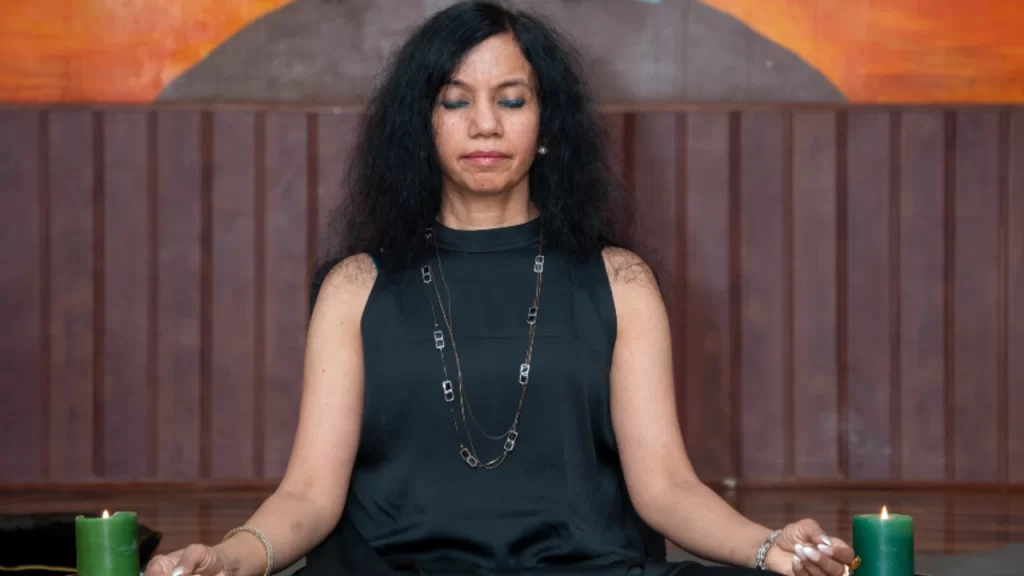These days, it is not easy to find peace because the world is quickening. The life activities put too much demand on an individual, and most times, these activities prevent the proper time one needs for sleep and also affect emotional well-being. Therefore, the direct search for an effective solution starts. Guided meditation for sleep and anxiety can actually be a real-life changer, as it is adopted to promote calmness, clarity, and a healthy emotional state. This mindfully conducted practice helps one manage stress, increases concentration, and relaxes; it becomes a go-to practice for improving mental health.
That is to say, guided meditation is a combining of visualization with breathing exercises and mindfulness achieved to provide a completely holistic approach to anxiety and deep, restorative sleep. In turn, this could yield long-lasting benefits such as significantly reduced stress, greater quality of sleep, and increased clarity. This tool is available to both beginners and advanced mediators so that anyone can take charge of mental health.
Explore the overview of different types and different aspects of advantages that guided meditation provides for your evening routine, which surely leads to that peace of mind one deserves.
What Is Guided Meditation for Sleep and Anxiety?
Guided meditation is a type of practice that is conducted in a structured format by either an expert facilitator, or through audio guides. Most sessions emphasize visualizing certain mental pictures, breathing exercises, mindfulness and similar practices meant to calm the mind and relax the body as well. This is, in fact, a practical solution to many people who suffer from sleep and anxiety problems in creating a non-intrusive safe environment while coping with their stress and at the same time emotional well-being.
What Unique guided meditation for sleep and anxietyy is the much simpler and more accessible approach. Hence any participant, either novice or an expert practitioner, can avail of the benefits this program offers in their quest for peace of mind or quality sleep.
The Benefits of Guided Meditation
Scientific research supports guided meditation as effective in promoting good mental and physical health. It is proven to decrease stress, improve sleep, and promote emotional balance. Guided meditation, which promotes mindfulness and relaxation, helps the mind to handle anxiety and get a feeling of calm. However, consulting professionals like life coach India will help in more profound meditation practice and proper guidance towards mental clarity and wellness. Guided meditation enables individuals to bring about long-term positive changes in their health, thereby enhancing the quality of life.
1. Enhanced Sleep Quality
Most of us suffer from insomnia or disrupted sleep patterns. guided meditation for sleep and anxiety activates the parasympathetic nervous system, reduces stress hormones, and prepares the body for restful sleep.
2. Reduction in Anxiety
It cultivates mindfulness, which makes people live in the moment and prevents them from entering into anxious thoughts. Gradually, it decreases anxiety to a great extent by silencing the hyperactive brain.
3. Improved Focus and Clarity
Practicing meditation on a daily basis enhances concentration and minimizes mental fogginess, helping you tackle issues with clarity and confidence.
4. Physical Relaxation
It involves progressive muscle relaxation and controlled breathing, which releases physical tension, thereby making you feel more relaxed and comfortable.
5. Emotional Resilience
Meditation builds emotional awareness and resilience, preparing people to tackle life’s challenges with a well-balanced mind.
Guided Meditation Techniques for Sleep
Guided meditation can be tailored to address specific needs, especially when it comes to sleep. Here are some of the most popular techniques:
1. Body Scan Meditation
This technique involves paying attention to different parts of the body, starting from the toes and moving upwards. It is meant to let go of tension and relax completely.
2. Breathing Exercises
Controlled breathing is at the core of meditation. Methods such as 4-7-8 breathing-inhale for 4 counts, hold for 7, exhale for 8-will slow down your heart rate and quiet your mind.
3. Visualization
Visualization of calm landscapes, such as a peaceful beach or a quiet forest, shifts the focus from stress to relaxation and creates mental space for restful sleep.
4. Mantra Repetition
Using soothing phrases like “I am calm” or “I am safe” can quiet an overactive mind, lulling you into sleep.
Techniques for Managing Anxiety
Guided meditation is offered for individuals who suffer from anxiety and find a number of practices that can help regain control and balance:
1. Mindfulness Meditation
Focus on your breath, bodily sensations, or surroundings to be grounded in the present moment and disentangled from anxious thoughts.
2. Loving-Kindness Meditation
The practice consists of sending positive thoughts towards yourself and others, with the purpose of developing compassion and reducing negative emotions.
3. Cognitive Defusion
Identify and detach yourself from distressing thoughts by just seeing them as transient thoughts rather than facts.
4. Breath Awareness
This one is simple yet effective and it is about observing breathing patterns to create a rhythmic flow that will subdue anxiety.
Enhancing Your Meditation Practice
This would be even further amplified with complementary practices such as incorporating guided meditation for sleep and anxiety. Consider this list below:
Family Constellation: This will help to reveal unresolved family dynamics that may be contributing to the anxiety, fostering deeper healing on an emotional level.
Alchemy Energy Healing: It helps avert mental and emotional blockages within an individual by balancing one’s energy flow to enable proper relaxation.
Healing Stone Therapy: With amethyst and blue lace agate crystals believed to make individuals more tranquil, its application to meditation practice can be priceless.
Life Counseling: Helps you identify triggers and build healthier ways of coping, enhancing the mindfulness achieved through meditation.
Creating a Routine for Guided Meditation
Consistency is the key to experiencing guided meditation for sleep and anxiety. Here is how to make it a part of your daily life:
Morning Meditation
Start your day with a 10-minute guided session to give a positive tone and clear your mind.
Midday Break
Re-center yourself and recharge your energy during lunch or a break for 5-10 minutes.
Evening Meditation
Before bed, dedicate 30 minutes to calming techniques like visualization or body scanning to prepare for restful sleep.
Apps and Resources for Guided Meditation
If you’re new to guided meditation, apps like Calm, Insight Timer, and Headspace offer a wide range of sessions tailored for sleep and anxiety. Many of these include:
- Step-by-step instructions for beginners.
- Sleep stories and soundscapes to aid relaxation.
- Daily reminders to help you stay consistent.
Why Guided Meditation Works
Guided meditation engages both the mind and body in a holistic approach to managing stress and improving sleep. Focused breathing, visualization, and mindfulness all work together to relax the body while training the mind to disengage from distractions.
In addition, the guided format is accessible to everyone because it provides a structured framework that is easy to follow, even for beginners.
Transform Your Life with Guided Meditation
It can transform your mental and physical health with guided meditation for sleep and anxiety. Its benefits reach beyond the practice itself and influence relationships, productivity, and more.
Start with 10 minutes a day and build up your sessions. Combine your meditation with complementary therapies like alchemy energy healing or healing stone therapy to go deeper into the practice.
Remember, the secret to winning is in consistency. Inculcate guided meditation as a non-negotiable aspect of your daily life, and watch the enormous difference it will make for you.
Conclusion
Guided meditation is a simple yet powerful way to cultivate relaxation and emotional balance, as well as sleep. Combining techniques such as mindfulness, visualization, and focused breathing reduces stress, improves mental clarity, and renders it easier to manage one’s anxiety. All of this culminates in strengthening the emotional muscles through continual practice of the technique, which makes it easier to withstand life’s challenges. Perhaps the best aspect of guided meditation is that it is accessible to anyone-be it a novice or that experienced, there is always a systematic way of reaching the inner sanctum. Little ingredients kept in the process will certainly change the face of mental and physical well-being in the course of time.







Leave a Reply